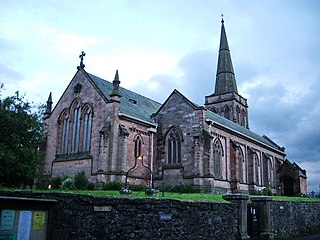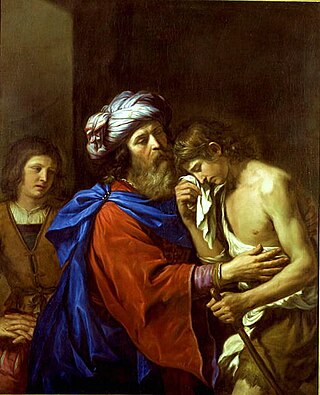Methodism, also called the Methodist movement, is a Protestant Christian tradition whose origins, doctrine and practice derive from the life and teachings of John Wesley. George Whitefield and John's brother Charles Wesley were also significant early leaders in the movement. They were named Methodists for "the methodical way in which they carried out their Christian faith". Methodism originated as a revival movement within Anglicanism with roots in the Church of England in the 18th century and became a separate denomination after Wesley's death. The movement spread throughout the British Empire, the United States and beyond because of vigorous missionary work, and today has about 80 million adherents worldwide.

Concupiscence is an ardent longing, typically one that is sensual. In Christianity, particularly in Catholic and Lutheran theology, concupiscence is the tendency of humans to sin.
The Holiness movement is a Christian movement that emerged chiefly within 19th-century Methodism, and to a lesser extent influenced other traditions such as Quakerism, Anabaptism, and Restorationism. Churches aligned with the holiness movement teach that the life of a born again Christian should be free of sin. The movement is historically distinguished by its emphasis on the doctrine of a second work of grace, which is called entire sanctification or Christian perfection. The word Holiness refers specifically to this belief in entire sanctification as an instantaneous, definite second work of grace, in which original sin is cleansed, the heart is made perfect in love, and the believer is empowered to serve God. For the Holiness movement, "the term 'perfection' signifies completeness of Christian character; its freedom from all sin, and possession of all the graces of the Spirit, complete in kind." A number of Christian denominations, parachurch organizations, and movements emphasize those Holiness beliefs as central doctrine.
The Wesleyan Church, also known as the Wesleyan Methodist Church and Wesleyan Holiness Church depending on the region, is a Methodist Christian denomination in the United States, Canada, the United Kingdom, South Africa, Namibia, Sierra Leone, Liberia, Indonesia, and Australia. The church is aligned with the Wesleyan-Holiness movement and has roots in the teachings of John Wesley. It adheres to Wesleyan-Arminian doctrine and is a member of the World Methodist Council.
Sanctification literally means "to set apart for special use or purpose", that is, to make holy or sacred. Therefore, sanctification refers to the state or process of being set apart, i.e. "made holy", as a vessel, full of the Holy Spirit of God. The concept of sanctification is widespread among religions, including Judaism and especially Christianity. The term can be used to refer to objects which are set apart for special purposes, but the most common use within Christian theology is in reference to the change brought about by God in a believer, begun at the point of salvation and continuing throughout the life of the believer. Many forms of Christianity believe that this process will only be completed in Heaven, but some believe that complete entire sanctification is possible in this life.
In Christian theology, baptism with the Holy Spirit, also called baptism in the Holy Spirit or baptism in the Holy Ghost, has been interpreted by different Christian denominations and traditions in a variety of ways due to differences in the doctrines of salvation and ecclesiology. It is frequently associated with incorporation into the Christian Church, the bestowal of spiritual gifts, and empowerment for Christian ministry. Spirit baptism has been variously defined as part of the sacraments of initiation into the church, as being synonymous with regeneration, or as being synonymous with Christian perfection. The term baptism with the Holy Spirit originates in the New Testament, and all Christian traditions accept it as a theological concept.

Within many denominations of Christianity, Christian perfection is the theological concept of the process or the event of achieving spiritual maturity or perfection. The ultimate goal of this process is union with God characterized by pure love of God and other people as well as personal holiness or sanctification. Other terms used for this or similar concepts include entire sanctification, holiness, perfect love, the baptism with the Holy Spirit, the indwelling of the Holy Spirit, baptism by fire, the second blessing, and the second work of grace.

The Higher Life movement, also known as deeper Christian life, the Keswick movement or Keswickianism, is a Protestant theological tradition within evangelical Christianity that espouses a distinct teaching on the doctrine of entire sanctification.

The conservative holiness movement is a loosely defined group of theologically conservative Christian denominations with the majority being Methodists whose teachings are rooted in the theology of John Wesley, and a minority being Quakers (Friends) that emphasize the doctrine of George Fox, as well as River Brethren who emerged out of the Radical Pietist revival, and Holiness Restorationists in the tradition of Daniel Sidney Warner. Schisms began to occur in the 19th century and this movement became distinct from parent Holiness bodies in the mid-20th century amid disagreements over modesty in dress, entertainment, and other "old holiness standards". Aligned denominations share a belief in Christian perfection, though they differ on various doctrines, such as the celebration of the sacraments and observance of ordinances, which is related to the denominational tradition of the specific conservative holiness body—Methodist, Quaker, Anabaptist or Restorationist. Many denominations identifying with the conservative holiness movement, though not all, are represented in the Interchurch Holiness Convention; while some denominations have full communion with one another, other bodies choose to be isolationist.

The Evangelical Methodist Church (EMC) is a Christian denomination in the Wesleyan-Holiness tradition headquartered in Indianapolis, Indiana. The denomination reported 399 churches in the United States, Mexico, Burma/Myanmar, Canada, Philippines and several European and African nations in 2018, and a total of 34,656 members worldwide.
The Fire-Baptized Holiness Church was a holiness Christian denomination that was based in North America. It was unique in that it taught three works of grace prior to the advent of Holiness Pentecostalism, though with a different doctrinal formulation; it continues today in the following denominations: International Pentecostal Holiness Church, Fire Baptized Holiness Church of God of the Americas, Pentecostal Fire-Baptized Holiness Church, Bible Holiness Church and Wesleyan Holiness Alliance.

Wesleyan theology, otherwise known as Wesleyan–Arminian theology, or Methodist theology, is a theological tradition in Protestant Christianity based upon the ministry of the 18th-century evangelical reformer brothers John Wesley and Charles Wesley. More broadly it refers to the theological system inferred from the various sermons, theological treatises, letters, journals, diaries, hymns, and other spiritual writings of the Wesleys and their contemporary coadjutors such as John William Fletcher, Methodism's systematic theologian.

In Christianity, sin is an immoral act and transgression of divine law. The doctrine of sin is central to the Christian faith, since its basic message is about redemption in Christ.
Finished Work Pentecostalism is a major branch of Pentecostalism that holds that after conversion, the converted Christian progressively grows in grace. On the other hand, the other branch of Pentecostalism—Holiness Pentecostalism teaches the Wesleyan doctrine of entire sanctification as an instantaneous, definite second work of grace, which is a necessary prerequisite to receive the baptism in the Holy Spirit. Finished Work Pentecostals are generally known to have retained the doctrine of progressive sanctification from their earlier Reformed roots, while Holiness Pentecostals retained their doctrine of entire sanctification from their earlier Wesleyan roots. William Howard Durham is considered to be the founder of Finished Work Pentecostalism.

According to certain Christian traditions, a second work of grace is a transforming interaction with God that may occur in the life of an individual Christian. The defining characteristics of the second work of grace are that it is separate from and subsequent to the New Birth, and that it brings about significant changes in the life of the believer. In the Methodist, the Quaker and the Holiness Pentecostal traditions of Christianity, the second work of grace is traditionally taught to be Christian perfection.
Pentecostalism is a renewal movement within Protestant Christianity that places special emphasis on a direct personal relationship with God and experience of God through the baptism with the Holy Spirit. For Christians, this event commemorates the descent of the Holy Spirit upon the followers of Jesus Christ, as described in the second chapter of the Book of Acts. Pentecostalism was established in Kerala, India at the start of the 20th century.
The third work of grace, also called the third blessing, is a doctrine, chiefly associated with Holiness Pentecostalism, that refers to baptism with the Holy Spirit with speaking in tongues as evidence for the same. The baptism of the Holy Ghost is taught by Holiness Pentecostals to empower the Christian believer for service to God.
Protestant theology refers to the doctrines held by various Protestant traditions, which share some things in common but differ in others. In general, Protestant theology, as a subset of Christian theology, holds to faith in the Christian Bible, the Holy Trinity, salvation, sanctification, charity, evangelism, and the four last things.

The Immanuel Missionary Church (IMC) is a Methodist denomination within the conservative holiness movement.

Holiness Pentecostalism is the original branch of Pentecostalism, which is characterized by its teaching of three works of grace: [1] the New Birth, [2] entire sanctification, and [3] Spirit baptism evidenced by speaking in tongues. The word Holiness refers specifically to the belief in entire sanctification as an instantaneous, definite second work of grace, in which original sin is cleansed and the believer is made holy, with the heart being made perfect in love.








